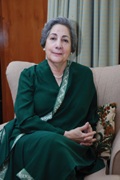With her dedication and dauntless disposition, the elegant and charismatic Begum Laila Sarfaraz has transformed the All Pakistan Women’s Association (APWA) into a dynamic and vibrant organization. She talks to Blue Chip about her experience at APWA and her vision for the future
Though Begum Laila Sarfaraz hails from one of Pakistan’s most renowned philanthropic families, she had never done any social work before joining APWA. It was the tragic death of her daughter, Zara that radically altered her life, “I lost my daughter in 1996 and after that, life stopped meaning anything – as far as society goes, and dinners and parties which I was very much into – life became a chore.”
It was on the insistence of the then APWA president, Begum Fareedi, that Begun Laila agreed to head the organization. Though she initially refused, Begum Fareedi reminded her of the pivotal role that her mother, Lady Nusrat Haroon, had played in setting up APWA. Her mother was one of the founding members of APWA. “The very first meeting of APWA took place at my mother’s residence with Begum Ra’ana Liaquat Ali Khan at the head of the table. That was 1949. My mother was always there for Begum Ra’ana Liaquat; she helped in putting up Gul-e-Raana Nusrat Industrial Home,” says Begum Laila.
Her sister, Begum Daulat Hidaytillalh had also been President of APWA. “I was not keen at all to come into APWA because I knew what it entailed, but with much persuasion, I decided that I would come and look into the finances,” explains Begum Laila.
At that time, APWA’s finances were in a fragile state and Begum Fareedi decided to maker her Vice Chairperson of Finance. “APWA was running on the bare amount that they could muster together,” says Begum Laila. She agreed to come in thrice a week to look into the finances as Begum Fareedi had urged. Although APWA had fully running projects, these were operating on the minimum. Understanding that the finances are at the heart of the success of every organization, Begum Laila made this a top priority.
Overhauling the finances entailed taking on an administrative role as well, and soon Begum Laila found herself increasingly immersed in transforming the organization. At times she encountered resistance in bringing about change. However, she credits Yasmeen Dastur for all her support during this time. “She was a great support and helped me when I ran into difficulties. She joined APWA straight out of university and has stayed here since then. And of course, Yasmeen was very close to Begum Ra’ana Liaquat who adored her.”
Begum Laila joined APWA in 1998 and now after 12 years, APWA is now a financially secure organization and undertaking a vast array of projects in healthcare, education and family planning.
She is deeply inspired by the pioneering vision of Begum Ra’ana Liaquat, “She deserves a lot of respect and credit for bringing the women of Pakistan to the forefront.”
Her late mother, Lady Nusrat Haroon, has also been a source of inspiration. “My mother was a remarkable human being, she was like a grandmother to me because by the time I was born, she was about 35-years-old and in those days that was considered past childbearing age! She had 10 children and I was the youngest of the lot, so I was the longest with her and she instilled me with her thoughts and values which have carried me through life. My mother told us a lot of things which have helped me through my difficult times. She was an amazing woman. My father died when I was just five years old and my mother must was in her early forties but she took charge of his business and the home.” She gained renown for her leadership qualities and Quaid-e-Azam appointed her as president of the Women’s Muslim League. “She was my role model,” says Begum Laila.
Though APWA has made great strides under Begum Laila’s presidency, she shill plans to take the organization further, “My vision is to take APWA to a level where it is recognized as it used to be — as the foremost organisation of the country.”
APWA was the brainchild of Begum Ra’ana Liaquat Ali Khan, established in 1949. Under the auspices of APWA, Mrs. Liaquat set up schools, dispensaries, maternity homes and family planning clinics in both urban and rural areas. Her basic creed was health, education and training. By the mid 1950′s APWA had 32 district branches with a total membership of about 1200 women of whom about 800 were said to be actively engaged in social work.
APWA maintained contacts with other women through its 20 industrial homes where an estimated 40,000 women passed through various stages of training each year. Further more through its 100 social welfare centers, 6 dispensaries and 13 basic education centers, another 15,000 women were being reached.
Approximately 8,000 children attended the primary schools run by APWA. Higher level education institutions opened by APWA included the College for Sciences and Arts that was established in Karachi in 1964. The APWA College for Women in Lahore became a full degree college in 1958.
In addition to her work at APWA, Begum Laila is on the board of several institutions including the Sindh Rural Support Program, SIUT and the Lady Dufferin Hospital. She is also a member of the Technical Assistance Study Group with the Asian Development Bank and a member of the Council of Social Welfare.




